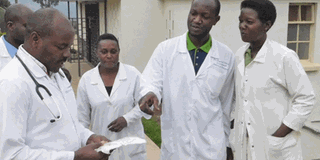Medical students breathe life into Kabale referral hospital

Appreciated. Some medical students of Kabale University at Kabale Regional Referral Hospital last week. PHOTO BY ROBERT MUHEREZA
What you need to know:
- Advantage. Patients say many of them are worked on in a short time unlike in the past where they had to wait for long.
Kabale. The establishment of Kabale University School of Medicine at Kabale Regional Referral Hospital has improved delivery of health services at the facility.
The school, which commenced in March after signing of a Memorandum of Understanding with the hospital, uses the old outpatient department and the patients’ wards for their practical lessons.
Kabale hospital has been struggling to attend to the high number of patients due to inadequate manpower.
According to the hospital director, Dr Sophie Namasopo, medical students especially those pursuing post graduate studies together with their lecturers have become great asset to the medical facility.
“There has been a gap of critical cadres for offering quality health services at Kabale Regional Referral Hospital, the establishment of the Kabale University School of Medicine has been great relief. We have four students doing Master’s degrees in medicine and their seven lecturers working here. We have 12 students training as anaesthetists, they have brought significant improvement in service delivery,” Dr Namasopo said.
The hospital has only four consultants (gynaecologist, paediatrician, surgeon and a general physician) out of the 12 required, and three medical officers out of the required 10.
Medical workers decline job offers at the hospital because of its distant location from the city and less opportunities for building personal careers.
Dr Namasopo adds that staff at the hospital have been given opportunity to teach in the school, and that with the partnership they are now in position to attract and retain more qualified staff.
Kabale University secretary, Mr Johnson Baryantuma Munono, says that the idea of starting the medical school was hatched in 2015 by a task force of health consultants that hail from Kigezi sub region.
Kabale University was established in 2001 as private institution but government took it up in 2015. It was teaching mainly humanities and business courses.
Mr Munono says they were concerned about the lack of specialists as patients were regularly referred to Mbarara and Mulago hospitals.
The hospital serves Kabale, Kisoro, Kanungu and Rukungiri districts. It also receives patients from the neigbouring countries of Rwanda and DR Congo.
He adds that about 40 senior and assistant lectures including three consultants that have been employed in the school are supplementing health service delivery at the hospital. The school has 100 medical doctor trainees.
“The professors employed at the school of medicine are doing a great job at Kabale hospital especially at the maternity ward. It’s our desire to recruit more for benefit of the students, and better health service delivery. The university has committed a lot of resources to purchasing of the equipment for the medical students as one of the measures of producing quality doctors,” says Mr Munono.
Mr Denis Muganza, a patient, says the medical students and those studying nursing at Kabale School of Comprehensive Nursing and Kabale Health Institute are helping a lot.
Ms Lillian Kyomuhangi a patient shares the same view.
“Many patients are worked on in a short time unlike in the past where they had to wait for long because of relying on only the hospital staff,” she says.
Dr David J.M. Zirabamuzaale, a student of Master of Medicine and the team leader of the medical students, says they have a conducive learning environment and the exposure they require for academic excellence.
“We have good professors and senior lectures in the school of medicine and I am sure the quality of doctors being trained here will be at an international level..,” Dr Zirabamuzaale says.
The hospital receives an average of 200 in-patients and 200 out-patients every day.
Malaria, pneumonia, malnutrition, maternal problems, Tuberculosis and HIV/AIDS are the major patient complications.
Dr Namsopo says there is need for the establishment of a blood bank at the hospital to address the shortage of blood for transfusion. They are currently relying on Mbarara Regional Blood Bank which is about 140km away.


